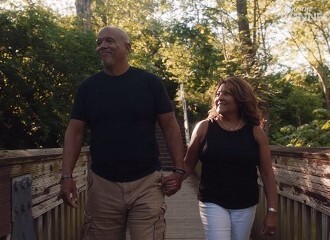For These Married Veterans, Mental Health Is a Team Effort
5-minute read
For These Married Veterans, Mental Health Is a Team Effort
5-minute read
Mike, a Marine Corps Veteran, had symptoms of posttraumatic stress disorder (PTSD) that were greatly amplified by the devastating loss of his son, who was killed in action in Afghanistan. He reached a point where he stood on the brink of suicide.
Valerie, a U.S. Army Veteran, fought feelings of shame and self-blame after she was sexually assaulted by a fellow Soldier. For almost 40 years, she kept her experience of military sexual trauma to herself and tried to hide the symptoms she felt.
Separately, Mike and Valerie were on their own mental health journeys. When the ninth-grade classmates reconnected and then married, Mike and Valerie found strength and support in each other that helped each of them achieve a new level of peace. Their story highlights how mutual support through a spouse, a partner, other family members or friends can reinforce the benefits of mental health treatment.
Mike’s story

Love and Support
Mike served in the Marine Corps from 1981 to 2004 in various specialties: as a disbursing clerk while on active duty and in light armored infantry and counterintelligence while in the Reserve. He was a light armored infantry specialist when he was initiated into combat, after Iraq invaded Kuwait.
“It got real in a hurry,” Mike says.
At this time of his service in Desert Storm, Mike attempted to cope with the things he saw, experienced and felt by drinking heavily. Later, after receiving therapy, he came to understand that his first symptoms of PTSD emerged from this period of his service.
Four years after his retirement from the military, Mike reached a crisis point when his son joined the Marine Corps and was killed in action in Afghanistan in 2008.
“I found myself standing on a bridge,” Mike says. “I was done. And then I heard my son’s voice. It said, ‘Dad, it doesn’t end here. You’ve got work to do.’ I knew that this is not what I’m supposed to do.”
Mike eventually sought help at a Vet Center and found that talk therapy made a big difference for him. “Talk therapy was so important to me … because I didn’t talk for 50 years,” he says. He had kept silent on not only his experiences in the military but also his rough childhood.
“As you start talking it out and somebody’s there to show you, ‘Look, here’s what’s happening,’ it starts to make sense. Helping you with your sleep and helping you understand that alcohol’s not the answer,” Mike says.
Valerie’s story
Valerie, like Mike, kept many of her feelings bottled up after she served in the U.S. Army from 1981 to 1984. During her time in service as a radio operator, shortly after arriving at her duty station, she was sexually assaulted by a fellow Soldier.
“It affected my mental health in ways I didn’t even realize at the time,” Valerie says. “A lot of self-blame, wondering, ‘What did I do?’ And in the long run, it would affect me in ways that would just continue to last until I sought help.”
These symptoms were connected to feelings like anger, upset and resentment.
“I didn’t want who really knew me the best — my close family and my close friends — to see that there was something different about me,” she says.
Citing feelings of shame as one of her biggest barriers, Valerie says she didn’t talk to anybody about her trauma for nearly 40 years.
Mike and Valerie, together
When Mike and Valerie reunited, they were at different points in their mental health journeys. Mike was the first to seek mental health care and feel the benefits of therapy, while Valerie remained silent about her trauma. But Mike recognized some of her PTSD symptoms, like hypervigilance, and encouraged her to seek help.
“I was in a place with him that I was safe, and it really was his prompting that helped me take that step,” Valerie says. “I couldn’t have done it without his encouragement and support and love.”
“He spoke from experience in that he was already seeing a therapist,” Valerie adds. “I had never heard of the Vet Center, but he suggested I go.”
Overcoming her internal misgivings, Valerie met with a therapist who she says changed her life. “For the first time in my life, I recognized I was not to blame,” she recalls. “I recognized that there was hope. And he helped me to be able to just take those first steps and move forward.”
Cognitive behavioral therapy and participation in a mental health group for women Veterans put Valerie on a better path.
Mike and Valerie say they now lean on each other often for support and to ground themselves in the present. They build on what they’ve gained through therapy: openness, communication skills, and an understanding of their behaviors and feelings. For example, they may pause during an argument to recognize that their feelings really originate from something that happened to Mike in Kuwait or Bosnia.
Mike describes Valerie as “that person that, when I come in from those hard days in the fire service, or watching a movie that takes me back, or when we’re thinking about my son — she gets it.”
“It really is helpful that he’s a Veteran and can understand,” Valerie says about Mike. “And I think for him as well — that I’m a Veteran and can understand.” She says she also appreciates that Mike doesn’t judge her when she opens up about her experiences.
Mike says, “I just try to be supportive. Just being there to have an ear to listen, shoulder to cry on, offering a hand when you need a hand up. Like she does for me.”
